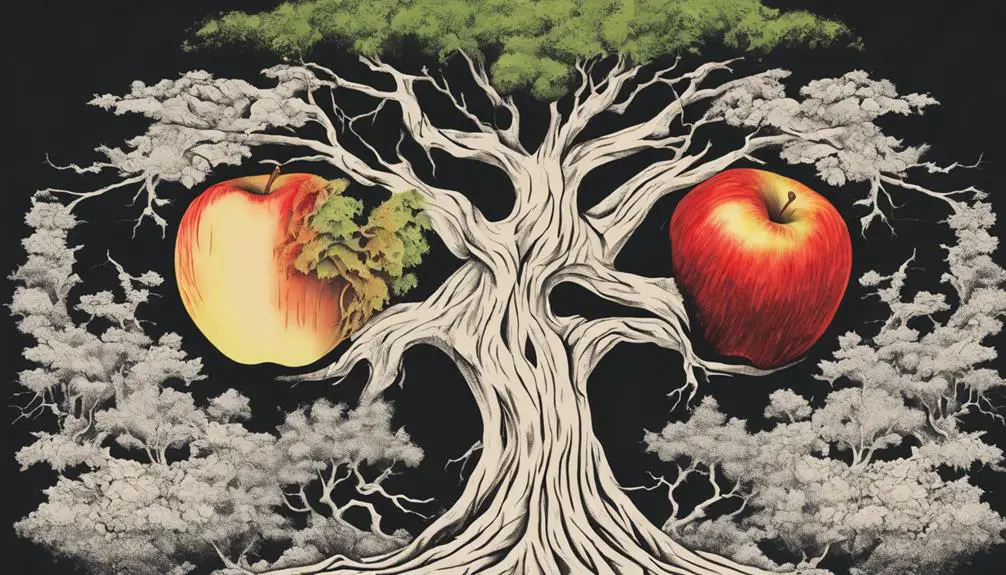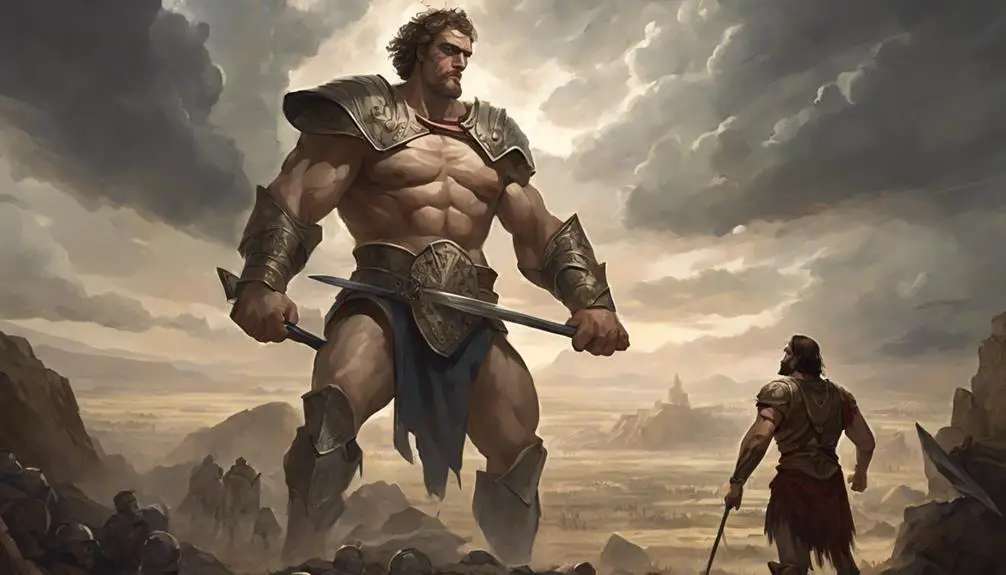From David and Goliath to the trials of Jesus, explore how divine opposition shapes destiny, in tales of resilience and faith.

Opposition in the Bible
You'd think the Bible was all peace and miracles until you stumble upon the epic showdowns and divine oppositions that could rival any modern-day blockbuster. From the very beginning, conflict weaves its way through the scriptures, creating a rich tapestry of divine lessons and human resilience.
Whether it's David going head-to-head with Goliath or Jesus facing the ultimate betrayal, these stories aren't just ancient history; they're lessons in overcoming adversity. So, if you're intrigued by how these timeless conflicts shape faith, character, and destiny, there's a wealth of insight waiting for you just beyond this introduction.
Key Takeaways
- Opposition often serves as a catalyst for growth and faith reinforcement in biblical narratives.
- Prophetic missions were marked by adversity, showcasing resilience and commitment to divine purposes.
- Biblical stories like David and Goliath teach the power of belief and overcoming great challenges with faith.
- The trials and sacrifices of Jesus and the apostles underscore the theme of enduring love and steadfastness amidst opposition.
The Genesis of Conflict

While examining the biblical narrative, it's evident that conflict first emerges in the book of Genesis, marking a fundamental aspect of human and divine interaction. This initial discord is illustrated through two pivotal stories: Cain's jealousy and Babel's ambition. These narratives serve as archetypes for understanding the multifaceted nature of opposition within the Bible.
Cain's jealousy towards his brother Abel is one of the earliest manifestations of conflict. This story underscores the destructive potential of envy and rivalry within familial relationships. It's not merely a tale of fraternal discord but a broader reflection on human nature's propensity towards jealousy and the extreme lengths to which it can lead, including violence and fratricide.
On the other hand, Babel's ambition reveals a collective human endeavor that challenges divine authority. The construction of the Tower of Babel is a testament to human ingenuity and determination. Yet, it also exemplifies the pitfalls of hubris and the pursuit of glory without heed to divine will, leading to confusion and dispersion.
These early biblical accounts encapsulate key themes of conflict, including personal jealousy and collective ambition, thereby setting the stage for understanding opposition's role in shaping human and divine relationships throughout the biblical narrative.
Prophets Facing Adversity

Throughout the biblical narrative, prophets frequently encounter adversity, embodying the complex relationship between divinely inspired missions and the challenges posed by societal rejection and hostility. This tension is vividly illustrated through:
- Jeremiah's Imprisonment: Jeremiah's unwavering commitment to delivering God's messages, despite the personal cost, culminates in his imprisonment. This episode underscores the severe consequences prophets often faced when their divine commissions collided with political and social realities.
- Elijah's Flight: Elijah's experience further exemplifies the theme of adversity. Following the triumph at Mount Carmel, the prophet flees Jezebel's wrath, highlighting the isolation and danger inherent in the prophetic role.
- Public Ridicule: Besides physical threats, prophets also grappled with mockery and disbelief from those they sought to guide. This ridicule not only intensified their isolation but also tested their faith and perseverance.
- Internal Struggle: The emotional and spiritual toll on prophets, as they navigated their duties amidst widespread opposition, is a recurring motif. This internal struggle often amplified the external challenges they faced.
These instances reflect the broader narrative of prophetic adversity, showcasing the resilience required to fulfill a divine mission in the face of overwhelming opposition.
David and Goliath: A Study

In the biblical account of David and Goliath, we observe a profound demonstration of faith and courage that challenges conventional notions of power and vulnerability. This narrative not only marks a pivotal moment in David's rise but also embodies the struggle between apparent weakness and ostensible strength, encapsulated through the symbolism of the giant and the shepherd.
Aspect |
Significance |
|---|---|
Giant Symbolism |
Represents overwhelming challenges, fear, and the external perception of invincibility. |
Shepherd Courage |
Symbolizes humility, faith, and the internal strength derived from conviction and trust in a higher power. |
The confrontation between David and Goliath is not merely a historical or religious anecdote; it serves as an allegorical lesson on the power of belief and the potential for the underdog to overcome seemingly insurmountable odds. David's victory elucidates a critical perspective on opposition: that the true measure of strength lies not in physical prowess or armaments but in the unwavering spirit and faith.
This story, therefore, encourages a reevaluation of how we perceive challenges and adversaries, suggesting that with faith and courage, even the most formidable giants can be defeated. It's a compelling narrative that continues to inspire and resonate, highlighting the timeless relevance of shepherd courage in the face of overwhelming odds.
Trials of the Apostles

The trials of the Apostles, as detailed in the New Testament, underscore the relentless challenges and persecutions they faced while spreading the Christian faith. These narratives not only highlight their unwavering faith but also serve as a testament to their resilience in the face of adversity. Among the numerous trials they encountered, a few stand out for their significant impact on Christian history:
- Stephen's Martyrdom: As the first Christian martyr, Stephen's death by stoning set a precedent for the persecution of Christians. His execution reflects the extreme opposition faced by the early followers of Jesus.
- Paul's Shipwreck: This event, detailed in Acts 27, exemplifies the physical dangers the Apostles encountered. Despite the peril, Paul's faith remained unshaken, showcasing his dedication to spreading the Gospel.
- Frequent Imprisonments: The Apostles, especially Paul, faced numerous incarcerations. These imprisonments served not only as physical confinement but also as opportunities for ministry.
- Social Ostracism: Beyond physical dangers, the Apostles endured rejection and ostracism from both Jewish and Roman societies. This isolation tested their resolve and commitment to their mission.
These trials, among others, illustrate the formidable opposition the Apostles overcame, underscoring the profound impact of their perseverance on the spread of Christianity.
Jesus' Ultimate Confrontation

Jesus' ultimate confrontation, his trial and crucifixion, marks a pivotal moment in Christian history, embodying the epitome of sacrifice and faith amidst severe opposition. This event not only signifies the fulfillment of prophetic scriptures but also illustrates Jesus' steadfast commitment to his divine mission, despite the profound challenges he faced. The temptation narrative, occurring at the outset of his ministry, foreshadows this confrontation, presenting Jesus as one who, even when faced with the allure of power and security, remains unwavering in his dedication to God's will.
The prayer in Gethsemane serves as a poignant prelude to the crucifixion, revealing Jesus' human vulnerability and divine obedience. Here, you witness his profound anguish and the depth of his resolve as he prepares to confront the culmination of his earthly ministry. This moment underscores the dual nature of Jesus' mission: it's both a personal test and a cosmic battle against the forces of sin and death.
Analyzing Jesus' ultimate confrontation through these lenses—his resistance during the temptation and his prayerful submission in Gethsemane—highlights the complexity of his opposition. It wasn't merely a battle against earthly authorities but a profound spiritual struggle, embodying the heart of the Christian message of redemption through sacrificial love.
Frequently Asked Questions
How Does the Concept of Opposition in the Bible Relate to Contemporary Issues of Social Justice and Equality?
You're exploring how themes of resistance and conflict intersect with today's struggles for social justice and equality.
By examining narratives of opposition, you'll find parallels in climate activism and economic disparity.
These stories illuminate the ongoing fight against injustice, highlighting how historical challenges mirror current issues.
Your analysis reveals the persistence of inequality and the importance of continued advocacy in addressing climate change and economic imbalances.
In What Ways Do the Bible's Teachings on Opposition Inform Modern Christian Ethics and Conflict Resolution?
When exploring modern Christian ethics and conflict resolution, you'll find that forgiveness practices and compassionate leadership are key. These principles, deeply rooted in scriptural teachings, guide you toward resolving disagreements and promoting understanding.
Can the Theme of Opposition in the Bible Offer Insights Into Navigating Personal Challenges and Adversities in Today's World?
You'll find that navigating personal challenges and adversities in today's world can indeed draw upon themes of resilience and growth.
By analyzing these trials through a lens of personal resilience and spiritual growth, you're equipped to approach hardships with a fortitude inspired by broader, timeless lessons.
This perspective fosters a deeper understanding of oneself and one's capabilities, encouraging a proactive stance towards overcoming life's hurdles.
How Is the Notion of Opposition Reflected in the Bible's Depiction of Gender Relations and Roles?
In analyzing the Bible's depiction of gender relations and roles, you'll find varied portrayals. Eve's role, often seen as subordinate due to the Genesis narrative, contrasts sharply with the empowered figure of the Proverbs 31 woman, who exemplifies virtue and strength.
This dichotomy reflects the complex nature of biblical gender perspectives, indicating that the text holds diverse, sometimes opposing, views on women's positions and capabilities within societal and familial structures.
What Parallels Can Be Drawn Between Biblical Oppositions and the Ideological Divides in Current Global Politics?
When you explore ideological divides in current global politics, you'll find historical parallels and elements of divine politics at play, reminiscent of ancient narratives. These divides often mirror biblical oppositions, reflecting deep-rooted beliefs and moral frameworks.
Conclusion
In analyzing the Bible's narratives, it's clear opposition serves as a catalyst for growth and revelation. From the foundational conflicts in Genesis to the profound trials faced by prophets, the David and Goliath metaphor, the apostles' adversities, and Jesus' ultimate confrontation, each instance underscores a pivotal truth.
Opposition isn't merely an obstacle; it's a divine instrument shaping faith, character, and destiny. Thus, understanding these narratives in their complexity reveals the indispensable role of conflict in spiritual evolution.



Sign up